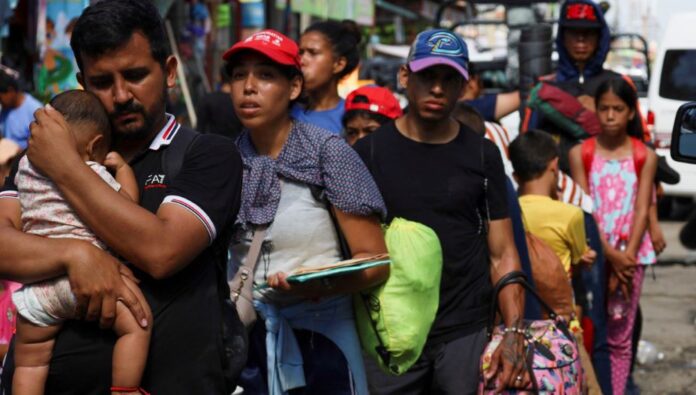A federal court has issued an injunction that prevents the Trump administration from executing its plan to relocate detained Venezuelan immigrants to the Guantanamo Bay military base. This ruling comes in the wake of intense scrutiny and debate over immigration policies and human rights concerns associated with the Guantanamo facility.
The lawsuit was brought forward by several immigration rights groups, who argued that the transfer of immigrants to Guantanamo would not only be inhumane but also potentially violate numerous constitutional and international laws. The contention was centered around the conditions at Guantanamo, which has been notorious for its treatment of detainees since its use in the War on Terror following the 9/11 attacks.
Also Read: Trump Claims U.S. Debt May Be Lower Due to Treasury Fraud
The judge presiding over the case emphasized that the use of Guantanamo for immigration detention raised serious legal and ethical issues, particularly concerning due process. The court noted the lack of adequate legal representation for immigrants at such a remote location, alongside concerns about the facility’s capacity to handle civilian detainees humanely, given its history and infrastructure.
This judicial intervention marks a significant moment in U.S. immigration policy, reflecting broader tensions between executive actions and judicial oversight. Critics of the Trump administration’s approach have long argued that such policies represent a shift towards more punitive measures without due consideration for humanitarian or legal standards.
The decision has sparked a wave of reactions from various quarters. Advocates for immigrant rights hailed the ruling as a victory for human rights, while some conservative lawmakers expressed frustration, arguing that the court’s decision hampers national security measures. Legal experts are now watching closely to see if this case might set a precedent for future immigration policy decisions.
As this legal battle unfolds, the debate over immigration, human rights, and the use of military facilities for non-military purposes continues to challenge American policy at both domestic and international levels. The administration has not yet announced whether it will appeal the decision, but the implications of this ruling will likely resonate through upcoming political and legal discussions on immigration.
Key Points:
Federal Court Decision: A federal court has blocked the Trump administration’s plan to send detained Venezuelan immigrants to Guantanamo Bay.
Legal Challenge: The decision follows a lawsuit by immigration rights groups, highlighting concerns over human rights and legal process.
Human Rights Concerns: The court cited inhumane conditions and potential violations of constitutional and international laws if immigrants were detained at Guantanamo.
Due Process Issues: The ruling emphasized the lack of legal representation and proper judicial process for immigrants at a remote military facility.
Political and Legal Implications: This case has sparked debate between supporters of stringent immigration control and advocates for human rights, potentially setting a precedent for future immigration policies.
Reactions: Immigration rights advocates celebrated the decision, while some conservative voices expressed concern over national security implications.
Ongoing Debate: The decision fuels ongoing discussions about immigration policy, human rights, and the use of military facilities for civilian detention in the U.S.
Next Steps: It’s unclear if the administration will appeal the court’s decision, but the ruling could influence future legal and political discourse on immigration.



